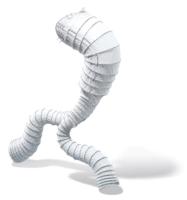
Lombard Medical has released efficacy and safety data from the two-year follow up of the US PYTHAGORAS pre-marketing approval (PMA) trial of Aorfix, the first and only endovascular stent graft with global approvals for the treatment of patients with aortic neck angulations up to 90 degrees.
The data were presented by Mark F Fillinger, principal investigator of the Aorfix PYTHAGORAS trial, director of vascular surgery training programmes, and professor of surgery at Geisel School of Medicine, Dartmouth, at the VEITHsymposium (18-22 November, New York City, USA). They showed 100% freedom from aneurysm rupture, 98% freedom from type I and type III endoleaks and 99% freedom from device migration in patients with a 60 to 90 degree aortic neck angulation, a group typically considered difficult-to-treat and associated with poor treatment outcomes.
Other key findings from the two-year data included 98.2% freedom from abdominal aortic aneurysm-related mortality and 97.2% freedom from graft occlusion in patients with neck angles between 60 to 90 degrees. Lombard Medical also presented results evaluating the use of Aorfix in patients with tortuous iliac anatomy who may be at increased risk of iliac limb occlusion and other complications, which are commonly caused by kinking, migration or dislocation of a stent graft, or extension of the graft into the external iliac artery.
The data, presented by Brian R Hopkinson, co-inventor of Aorfix and emeritus professor of vascular surgery at University of Nottingham and consultant vascular surgeon at Queen’s Medical Centre, UK, found that despite distinct changes in iliac angulation resulting from aneurysm regression (reversal) after endovascular aneurysm repair, the incidence of iliac-related complications did not increase and remained low.
“Aorfix is uniquely designed to treat patients with highly-angulated necks and yield consistently positive treatment outcomes in both challenging and more typical cases involving patients with angulations below 60 degrees,” said Simon Hubbert, chief executive officer of Lombard Medical.
Both data analyses were derived from the PYTHAGORAS study, which formed the basis of the FDA approval of Aorfix. The controlled, prospective, non-randomised, multicentre study evaluated 218 patients, a majority of whom had neck angles between 60 to 90 degrees. Lombard Medical anticipates publication of the two-year outcomes in 2015, and will continue to collect data on effectiveness and safety for up to five years post-implant.













